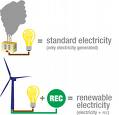- 5 reads

It’s expected that the Climate Bill will become law in the near future. It’s also expected this new legislation will arrive hand-in-hand with a cap-and-trade system; requiring companies with facilities emitting over 25,000 tonnes of carbon per year to reduce their emissions below a certain level. These companies will have the option to either make the actual emission reductions or to purchase offsets or credits from other businesses which have already reduced their carbon emissions.
While the debate over cap-and-trade is ongoing, there may be opportunity for financial gain for those companies who put themselves in a position to take advantage of it. With the introduction of a cap-and-trade system, we’ll also see the development of a multi-billion dollar market for carbon offsets and allowances. An expected byproduct of the carbon market should be a robust market for energy efficiency credits (White Tags) and renewable energy certificates (RECs). The potential for revenue opportunities that come along with these sellable credits could be substantial. Since this is a newly emerging marketplace, companies interested in exploring these financial opportunities should work closely with an energy consultant to be assured they have the most accurate and current information available.
White Tags™ each represent 1 MWh (megawatt hour) of electricity savings. They are the newest energy trading certificates to hit the market. White Tags reward efficient use of electricity and are defined through energy savings calculations. Currently three states have legislated energy efficiency credits to be included in their mandated portfolio standards and the expectation is that more states will follow suit.
RECs, on the other hand, “represent the property rights to the environmental, social, and other nonpower qualities of renewable electricity generation,” as defined by the EPA. Purchasing RECs is an alternative solution if renewable energy generation sources are not readily available. It is a way to support renewable energy development without purchasing the generation directly.
The majority of businesses will fall below the proposed carbon emission limit of 25,000, but may want to consider the financial gains of reducing their own carbon footprint and trading the equivalent credits described above with companies who do fall above the emission limits. Those companies that are anticipating the possible financial side effects of the upcoming cap-and-trade legislation would be prudent to become familiar with both of these types of sellable credits and seek out an energy consultant who can help them understand and participate in these markets.
This is a potential opportunity for not only additional cash flow but a financial and social incentive to green your business. Not every company will be prepared to benefit from the markets that will develop when the Climate Bill becomes law, but by getting an early start on cutting emissions, you could be one of the companies on the front end poised to take advantage of the opportunities as they evolve.
*** Laura Silkworth serves as Senior Energy Procurement Consultant at Advantage IQ, which has offices in Spokane, Wash., Cincinnati, Westminster, Colo., and Alpharetta, Ga. Advantage IQ offers a comprehensive set of expense management services that provide the necessary transparency needed to better manage enterprise wide utility, telecommunications, waste and lease expenses associated with your business facilities.

